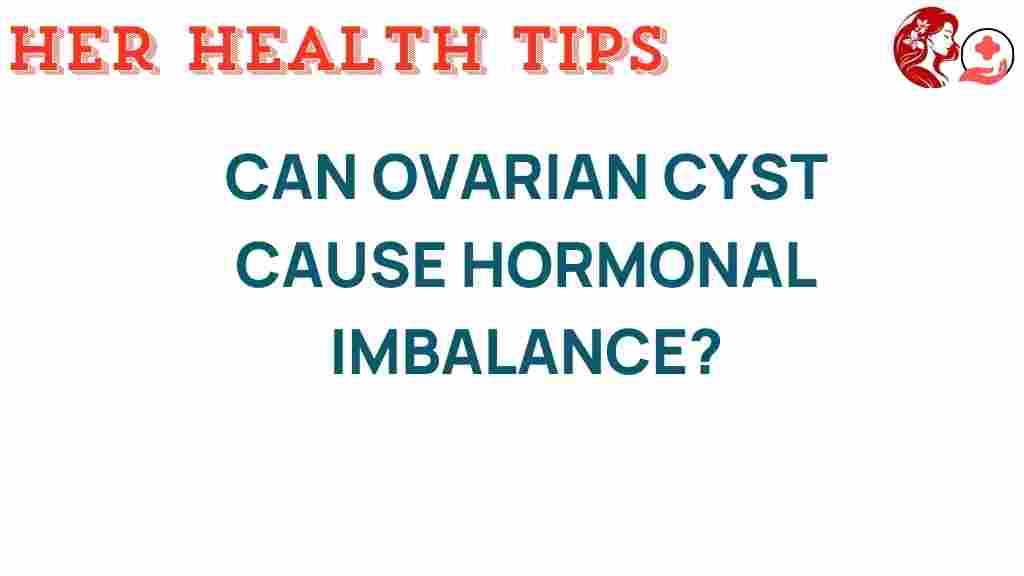Unraveling the Mystery: Can Ovarian Cysts Trigger Hormonal Imbalance?
Understanding the complexities of women’s health is essential, particularly when it comes to reproductive health issues like ovarian cysts. Ovarian cysts are fluid-filled sacs that can develop on the ovaries, and they are relatively common among women of reproductive age. However, their impact on hormonal balance and overall health can be significant. In this article, we will explore the relationship between ovarian cysts and hormonal imbalance, examine the symptoms, diagnosis, and treatment options, and discuss the implications for the endocrine system.
What Are Ovarian Cysts?
Ovarian cysts are typically benign (non-cancerous) growths that form on or within the ovaries. They can appear for various reasons, often related to the menstrual cycle. Here are some key points about ovarian cysts:
- Follicular Cysts: These cysts occur when the follicle doesn’t release an egg and continues to grow.
- Corpus Luteum Cysts: Formed after the follicle releases an egg, these cysts can fill with fluid.
- Dermoid Cysts: These are made up of different types of tissues, such as hair or skin, and can be present from birth.
- Endometriomas: Related to endometriosis, these cysts form when uterine endometrial tissue grows on the ovaries.
How Do Ovarian Cysts Affect Hormonal Imbalance?
The endocrine system regulates hormones in the body, and ovarian cysts can disrupt this delicate balance. Hormonal imbalance can lead to various symptoms and health issues. Here’s how ovarian cysts can play a role:
- Production of Estrogen: Some cysts produce excess estrogen, leading to an imbalance that can affect the menstrual cycle.
- Insulin Resistance: Women with conditions like Polycystic Ovary Syndrome (PCOS) often have multiple cysts and experience insulin resistance, which can contribute to hormonal imbalances.
- Impact on Ovulation: Cysts can interfere with the normal ovulation process, resulting in irregular periods and hormonal fluctuations.
Symptoms of Ovarian Cysts and Hormonal Imbalance
Recognizing the symptoms of ovarian cysts is crucial for early diagnosis and treatment. Many women may not experience symptoms, but when they do occur, they can include:
- Irregular periods or missed periods
- Pelvic pain or discomfort
- Hormonal acne or skin changes
- Weight gain, especially around the abdomen
- Fatigue or low energy levels
- Hirsutism (excess hair growth in unusual areas)
These symptoms often overlap with those of hormonal imbalance, making it essential to consult a healthcare provider for accurate diagnosis and treatment.
Diagnosis of Ovarian Cysts
Diagnosis typically involves a combination of medical history, physical examinations, and imaging tests. Here are the common steps involved:
- Medical History: The doctor will ask about menstrual cycles, symptoms, and any family history of reproductive issues.
- Pelvic Exam: A healthcare provider may perform a pelvic exam to check for abnormalities.
- Ultrasound: This imaging test helps visualize the cysts and assess their size and type.
- Blood Tests: Hormonal levels may be checked to identify any imbalances that could indicate ovarian dysfunction.
Treatment Options for Ovarian Cysts and Hormonal Imbalance
Treatment for ovarian cysts largely depends on their type, size, and associated symptoms. Here are some common approaches:
- Watchful Waiting: If the cyst is small and asymptomatic, doctors may recommend monitoring it over time.
- Medications: Hormonal contraceptives can help regulate the menstrual cycle and reduce the risk of new cyst formation.
- Surgery: In cases where cysts are large, painful, or suspected to be cancerous, surgical intervention may be necessary.
- Lifestyle Changes: For women with conditions like PCOS, lifestyle changes including diet and exercise can help manage symptoms and hormonal balance.
Managing Hormonal Imbalance
If hormonal imbalance is present, there are several strategies that can help restore balance:
- Nutrition: A balanced diet rich in whole foods, fruits, and vegetables can support hormonal health.
- Exercise: Regular physical activity can help manage weight and improve insulin sensitivity.
- Stress Management: Techniques such as yoga, meditation, and mindfulness can reduce stress, which positively impacts hormone levels.
- Consultation with Specialists: Endocrinologists or reproductive health specialists can provide tailored treatment plans for hormonal issues.
Understanding PCOS and Its Connection to Ovarian Cysts
Polycystic Ovary Syndrome (PCOS) is a common condition that affects women of reproductive age. It is characterized by multiple small cysts on the ovaries, hormonal imbalances, and a range of symptoms. Here are some essential aspects of PCOS:
- Symptoms: Irregular periods, weight gain, acne, and excessive hair growth.
- Hormonal Imbalance: Women with PCOS often have elevated levels of androgens (male hormones), which contributes to various symptoms.
- Treatment: Managing PCOS may involve lifestyle changes, hormonal treatment, and medications to regulate insulin and androgen levels.
For more detailed information on PCOS, you can read this external link from the American College of Obstetricians and Gynecologists.
Troubleshooting Tips for Women Experiencing Symptoms
If you are experiencing symptoms of ovarian cysts or hormonal imbalance, here are some troubleshooting tips to consider:
- Track Your Symptoms: Keep a diary of your menstrual cycle, symptoms, and any lifestyle changes.
- Seek Medical Advice: Consult a healthcare provider for a thorough evaluation and personalized recommendations.
- Consider Dietary Adjustments: Reducing processed foods and sugars can help manage insulin levels and hormonal fluctuations.
- Engage in Regular Exercise: Aim for at least 30 minutes of moderate exercise most days of the week.
Conclusion
Ovarian cysts can indeed trigger hormonal imbalances, impacting women’s health and reproductive health significantly. Understanding the relationship between ovarian cysts and hormonal health is essential for identifying symptoms, seeking proper diagnosis, and exploring effective treatment options. Whether it’s through lifestyle changes, medication, or specialized care for conditions like PCOS, addressing these issues early on can lead to better health outcomes. If you suspect you have ovarian cysts or are experiencing symptoms of hormonal imbalance, do not hesitate to reach out to a healthcare professional for guidance.
For further reading on women’s health topics, you can explore our resources here.
This article is in the category Reproductive and created by HerHealthTips Team
